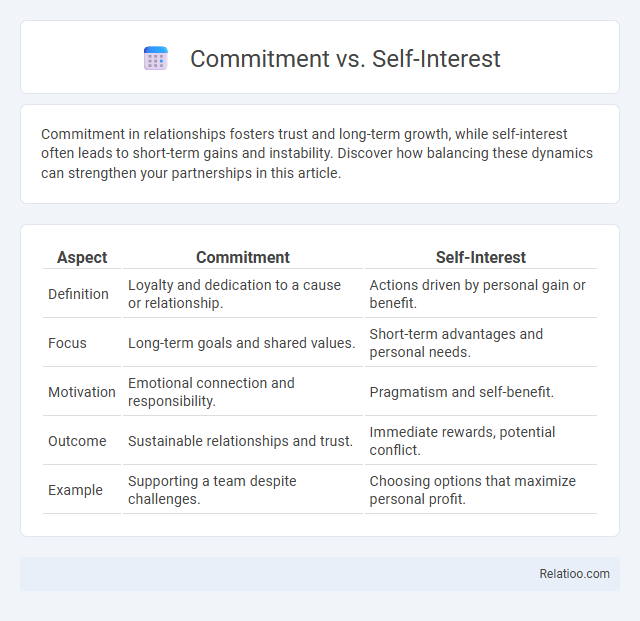Commitment in relationships fosters trust and long-term growth, while self-interest often leads to short-term gains and instability. Discover how balancing these dynamics can strengthen your partnerships in this article.
Table of Comparison
| Aspect | Commitment | Self-Interest |
|---|---|---|
| Definition | Loyalty and dedication to a cause or relationship. | Actions driven by personal gain or benefit. |
| Focus | Long-term goals and shared values. | Short-term advantages and personal needs. |
| Motivation | Emotional connection and responsibility. | Pragmatism and self-benefit. |
| Outcome | Sustainable relationships and trust. | Immediate rewards, potential conflict. |
| Example | Supporting a team despite challenges. | Choosing options that maximize personal profit. |
Defining Commitment and Self-Interest
Commitment involves a dedicated pledge or obligation to a cause, person, or goal, often characterized by consistent actions aligned with long-term values or objectives. Self-interest centers on pursuing outcomes that primarily benefit oneself, driven by personal gain or advantage without necessarily considering broader impacts. Understanding these terms aids in analyzing motivational dynamics in relationships and decision-making contexts.
The Psychology Behind Commitment
The psychology behind commitment reveals that individuals balance intrinsic motivation, emotional attachment, and perceived benefits when deciding to stay dedicated to a cause or relationship. Commitment often involves a complex interplay between self-interest, which drives goal-oriented behaviors, and selflessness, reflecting altruistic or collective well-being considerations. Neural mechanisms in brain regions like the prefrontal cortex and limbic system regulate this balance, influencing decision-making, emotional investment, and long-term adherence.
Understanding Self-Interest in Human Behavior
Understanding self-interest in human behavior reveals how individuals prioritize personal benefits and survival needs, often driving decision-making and social interactions. Your actions are frequently influenced by the desire to maximize rewards, whether material or psychological, while balancing commitments and moments of selflessness. Recognizing this balance helps explain motivations behind cooperation, competition, and sacrifice within various social contexts.
Commitment vs Self-Interest: Key Differences
Commitment involves dedicating oneself to a cause, goal, or relationship with consistent effort and loyalty, often prioritizing long-term benefits over immediate gratification. Self-interest focuses on actions that primarily benefit the individual, emphasizing personal gain and short-term advantages. The key difference lies in commitment's emphasis on collective or sustained outcomes, while self-interest centers on individual advantage and immediate rewards.
Benefits of Embracing Commitment
Embracing commitment enhances personal growth by fostering resilience and strengthening relationships through consistent trust and reliability. It cultivates a sense of purpose that transcends fleeting self-interest, promoting long-term fulfillment and community well-being. Commitment-driven actions align individual goals with broader societal benefits, creating a balanced interplay between selflessness and personal advantage.
Potential Drawbacks of Self-Interest
Self-interest, while driving personal ambition and goal achievement, can lead to ethical compromises and strained relationships when prioritized excessively. It may foster short-term benefits but risks undermining trust and collaboration within teams or communities. Balancing self-interest with commitment and selflessness helps mitigate these potential drawbacks by promoting mutual respect and long-term success.
Commitment in Personal Relationships
Commitment in personal relationships involves a dedicated intention to maintain and nurture the bond, often prioritizing mutual growth and emotional support. Unlike self-interest, which centers on individual benefit, commitment requires consistent effort and sacrifice to uphold trust and intimacy. This deep sense of responsibility fosters stability and resilience, essential for long-term relational satisfaction.
Self-Interest in Professional Environments
Self-interest in professional environments drives individuals to pursue goals that enhance their career growth, financial stability, and personal brand. Balancing self-interest with commitment ensures you remain motivated while contributing effectively to organizational success. Recognizing when to align personal ambitions with team objectives can foster a productive and mutually beneficial work atmosphere.
Finding Balance: Harmonizing Commitment and Self-Interest
Balancing commitment and self-interest requires recognizing the value of personal goals while honoring obligations to others, ensuring neither is sacrificed entirely. Effective harmonization involves setting clear boundaries that protect individual well-being without undermining relational responsibilities. This equilibrium fosters sustainable motivation and mutual respect, enhancing both personal fulfillment and collaborative success.
Practical Strategies for Navigating Conflicts
Balancing commitment, self-interest, and selflessness requires practical strategies such as active listening, clear communication, and setting boundaries to address conflicting needs effectively. By recognizing when to prioritize your goals versus the group's welfare, you can navigate conflicts with empathy and assertiveness. This approach fosters mutual respect and sustainable resolutions in both personal and professional relationships.

Infographic: Commitment vs Self-Interest
 relatioo.com
relatioo.com